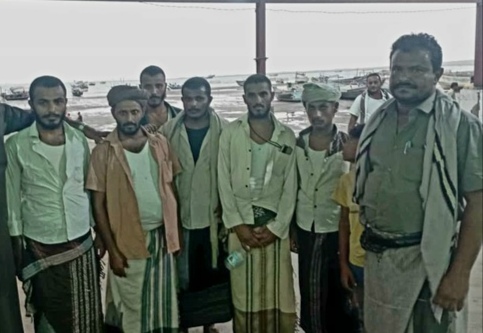Six Yemeni fishermen have returned to the fishing center in Al-Salif district, Hodeidah province, after more than four months of detention and torture in prisons run by Saudi forces. This incident adds to a long list of abuses targeting Yemeni fishermen in the Red Sea.
Upon their return, Rami Maqshara, director of the Al-Salif fishing center, stated that the released fishermen are a prime example of the escalating suffering faced by Yemeni fishermen. He noted they are often subjected to arbitrary detention, confiscation of boats and property, and the loss of their livelihoods by Saudi-led coalition forces and their Eritrean proxies.
Maqshara confirmed that the General Authority for Fisheries in the Red Sea condemns these criminal practices against unarmed fishermen. He called on international human rights and humanitarian organizations to intervene urgently, compel the coalition countries to cease their aggressions, protect fishermen, and ensure their right to safely practice their trade in Yemeni territorial waters.
He also emphasized that this incident isn’t isolated but has been systematically repeated over the past few years, threatening the safety of Yemeni fishermen and undermining their ability to continue working amidst the difficult economic and living conditions imposed by the conflict and blockade.
The fishermen shared their harrowing experience, explaining that they were fishing in Yemeni territorial waters near Aqban Island on a “Jalbah” type boat with eight crew members. They had been fishing for five days when an armed patrol from the Saudi-led coalition intercepted them and abducted them at gunpoint.
They recounted that the 20-person patrol took them to prisons on Farasan Island. There, their hands were tied behind their backs, and they endured harsh interrogations and torture under false accusations before being transferred to prisons in the Jizan region.
The fishermen stated that their time on Farasan Island lasted seven days of brutal questioning and treatment before their imprisonment continued in Jizan. They described the difficult humanitarian conditions, which included starvation, a lack of healthcare, and the confiscation of their personal belongings.
They noted that Saudi authorities released two of them by land for unstated reasons, while the remaining six were released by sea months later. They were not compensated for their losses or given back their confiscated property.
Before the fishermen left Al-Salif, the director of the center provided them with cash from the General Authority for Fisheries in the Red Sea. This humanitarian gesture was intended to help cover the costs of their return and secure some of their basic needs.
This incident serves as further evidence of the widespread abuses against Yemeni fishermen in the Red Sea, underscoring the need for urgent international action to protect them and hold those responsible for these crimes accountable. Such actions are a flagrant violation of international laws and norms.


















